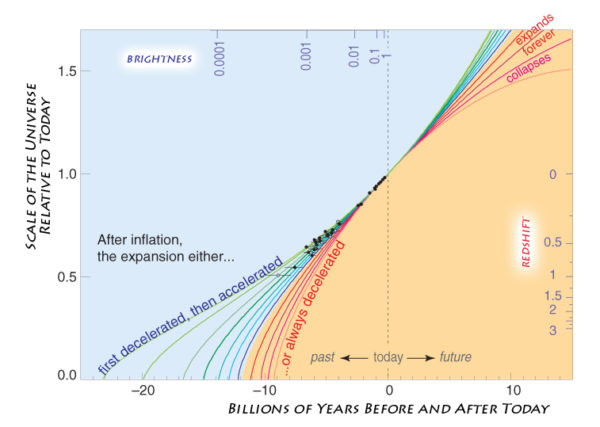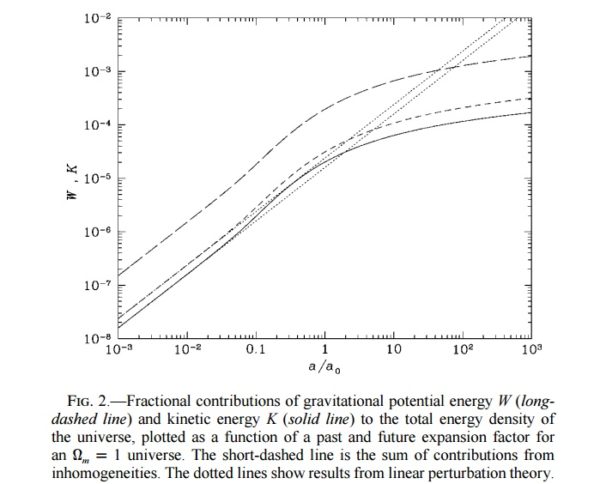"Losing an illusion makes you wiser than finding a truth." -Ludwig Borne
Every so often, an idea comes up in physics claiming that perhaps dark energy isn't real. The ideas focus on one of two lines of thought: either they discount the observational evidence, or they attempt to show that all the calculations are fundamentally flawed.
 Measuring back in time and distance (to the left of "today") can inform how the Universe will evolve and accelerate/decelerate far into the future. We can learn that acceleration turned on about 7.8 billion years ago. Image credit: Saul Perlmutter / UC Berkeley.
Measuring back in time and distance (to the left of "today") can inform how the Universe will evolve and accelerate/decelerate far into the future. We can learn that acceleration turned on about 7.8 billion years ago. Image credit: Saul Perlmutter / UC Berkeley.
The latter case often points to our Universe, and claim that our best models are based on a perfectly uniform Universe, while the actual Universe is very inhomogeneous. Yet these claims often forget one very, very important point: we know exactly how inhomogeneous the Universe is today, and those effects have been quantified. BY ME.
 The contributions of inhomogeneity energy to cosmic expansion (top line), up to today (1 on the x-axis), and the fractional contribution to the expansion rate. Note that even into the far future, the contribution never approaches 1. The straight lines are linear approximations; the curves are the full calculation. Image credit: E.R. Siegel and J.N. Fry, 2005.
The contributions of inhomogeneity energy to cosmic expansion (top line), up to today (1 on the x-axis), and the fractional contribution to the expansion rate. Note that even into the far future, the contribution never approaches 1. The straight lines are linear approximations; the curves are the full calculation. Image credit: E.R. Siegel and J.N. Fry, 2005.
Dark energy is no illusion, and here's the science to prove it!

Assuming expansion of universe really stopped someday, Big Crunch would be really like the reverse of Big Bang like it is generally thought? Galaxies and Dark Matter should coalesce because of gravity but how space-time could do the same? If space-time cannot contract back then the result should be an empty universe except a single black hole inside, isn't it?
I found it very strange that the people who wrote this new paper would either ignore or be totally unaware of previously published work that disproved their idea. That was especially true when I discovered that the work is published in MNRAS, which is a peer-reviewed publication, meaning that the reviewers were also ignorant of Ethan's and other's work. So I read the new paper, and it seems that the situation is a bit more complicated than Ethan implies. The authors of the new paper acknowledge that some past work claims inhomogeneities cannot account for the apparent accelerated expansion rate (and cite references) but they also state the matter is under debate. They also cite numerous references which indicate inhomogeneities may be important after all. So it seems that among cosmologists in general, the question of whether or not inhomogeneities can have a significant effect on the apparent expansion rate is not settled. I am not a cosmologist, so I cannot read all of the relevant papers and form an opinion on who has the strongest case. But the authors of this new paper DO seem aware of previous work like Ethan's (although they do not cite him in particular), and they cite references that call this previous work into question. As I said before, it seems at the very least the situation is a lot more complicated than 'These new authors aren't even aware their idea was disproved years ago!"
From a philosophical point of view, it looks strange that we have two mysterious inflation-of-the-universe mechanisms, one in the begining, one now.
An obvious simplification is to have just one.
Yes, I know, it contradicts a few things, supposedly well-established. But how are we really sure of them? There are quite a few things we were very sure of, even very recently... and now we understand not at all 95% of the matter-energy out there.
How deeply sure are we of the chronology of the Big bang, already?
I too am often of the same mind that it is the left-over inflation field that settled at a non-zero value. But this does invoke a new particle (which we have no hope of finding in accelerator) and expands the standard model. Problem is, there is still no way to rule out that it isn't.
Cosmological constant from GR is the most simple one... measurements do seem to support it, yet it's IMO more bizarre fundamentally then a new force.. but that's just me.
Zero-point, makes most sense from intuitive standpoint.. but that's the one that experimentally seems to be the worst one.
@ketchup,
The truth is almost always more complicated than Ethan portrays it, he will go to great lengths to simplify a situation to the point of being factually dishonest by omission of all the pesky details he knows will cause people to more closely scrutinize his assertions and question his undisclosed motives.
.
Ethan is actually up to his shiny head in what is called the 'double ethical bind', where he has decided being 'effective' at persuading others for largely social and political purposes (that aren't actually scientific) is more important than being accurate and truthful.
.
"On the one hand, as scientists we are ethically bound to the scientific method, in effect promising to tell the truth, the whole truth, and nothing but — which means that we must include all the doubts, the caveats, the ifs, ands, and buts. On the other hand, we are not just scientists but human beings as well. And like most people we’d like to see the world a better place, which in this context translates into our working to reduce the risk of potentially disastrous climatic change. To do that we need to get some broad based support, to capture the public’s imagination. That, of course, entails getting loads of media coverage. So we have to offer up scary scenarios, make simplified, dramatic statements, and make little mention of any doubts we might have. This ‘double ethical bind’ we frequently find ourselves in cannot be solved by any formula. Each of us has to decide what the right balance is between being effective and being honest. I hope that means being both."
.
The quote above was written by Dr. Judith Curry, someone Ethan has foolishly slandered by omission because he doesn't believe anyone outside the 'scientific consensus' should be considered as that could lead people to 'doubt' the monolithic truth he would like to pretend science is, a uniform understanding and agreement on evidence, data, and interpretation between certain experts that all agree. This view is utterly dishonest, and if it had any merit whatsoever, outsiders like Einstein or Copernicus or Galileo or Alfred Wegener would never had been heard about the roar of the 'consensus' of their respective times. In Wegener's case, he was ridiculed during his life by people much like Ethan who felt their consensus being challenged was a tantamount problem far bigger than being wrong, as their group-think did not consider that a possibility.
The article explains that alternative explanations have been ruled out by combining observations from supernovae, baryon acoustic oscillations, measurements of the cosmic background radiation and by looking at cosmic super structures. What if we are inside a gravitational lens, wouldn't we see the universe expanding through all kinds of observations? What if the speed of light is slowing down, wouldn't we see the universe expanding?
I believe that would be immediately detectable by looking at Cherenkov radiation, as the angle at which it is emitted is a function of the ratio of the speed of light in the medium to c.